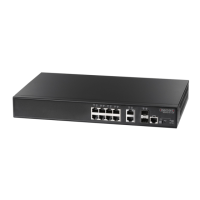Chapter 1
| Initial Switch Configuration
Basic Configuration
– 52 –
Obtaining an IPv6 Address
Link Local Address — There are several ways to configure IPv6 addresses. The
simplest method is to automatically generate a “link local” address (identified by an
address prefix in the range of FE80~FEBF). This address type makes the switch
accessible over IPv6 for all devices attached to the same local subnet.
To generate an IPv6 link local address for the switch, complete the following steps:
1. From the Global Configuration mode prompt, type “interface vlan 1” to access
the interface-configuration mode. Press <Enter>.
2. Type “ipv6 enable” and press <Enter>.
Console(config)#interface vlan 1
Console(config-if)#ipv6 enable
Console(config-if)#end
Console#show ipv6 interface
VLAN 1 is up
IPv6 is enabled.
Link-local address:
FE80::2E0:CFF:FE00:FD/64
Global unicast address(es):
(None)
Joined group address(es):
FF02::1:FF11:6700
FF02::1
IPv6 link MTU is 1500 bytes
ND DAD is enabled, number of DAD attempts: 3.
ND retransmit interval is 1000 milliseconds
Console#
Address for Multi-segment Network — To generate an IPv6 address that can be
used in a network containing more than one subnet, the switch can be configured
to automatically generate a unique host address based on the local subnet address
prefix received in router advertisement messages. (DHCP for IPv6 will also be
supported in future software releases.)
To dynamically generate an IPv6 host address for the switch, complete the
following steps:
1. From the Global Configuration mode prompt, type “interface vlan 1” to access
the interface-configuration mode. Press <Enter>.
2. From the interface prompt, type “ipv6 address autoconfig” and press <Enter>.
3. Type “ipv6 enable” and press <Enter> to enable IPv6 on an interface that has
not been configured with an explicit IPv6 address.
Console(config)#interface vlan 1
Console(config-if)#ipv6 address autoconfig
Console(config-if)#ipv6 enable
Console(config-if)#end

